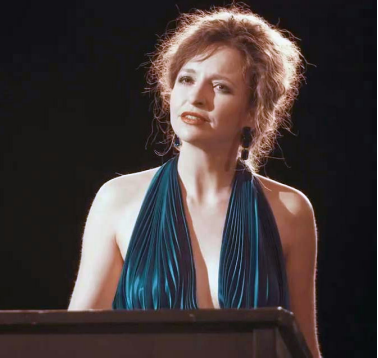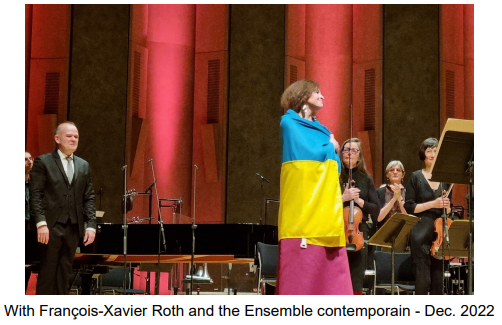
First I used the word “singer” in the title since Christina Daletska can sing on three octaves and thus is both a soprano and a mezzo. Born in 1984 in a family of musicians (Lviv, Ukraine), she learned firstly violin and viola, reaching the highest instrumental level before turning to vocals from 2006 and enjoying a successful career. She speaks seven languages, is a human rights activist and official ambassador for Amnesty International Switzerland (& Art) and has of course been struck by Poutine’s invasion of Ukraine. She lives in Switzerland.
I enjoyed already her voice and musicianship when she gave in Paris 10 years ago Philippe Manoury’s Gesänge-Gedanken mit Friedrich Nietzsche (see), She participated last December at the Philharmonie in the celebration of Philippe Manoury’s 70th birthday. Before the intermission, she sang a capella a moving song composed by Manoury for the victims of the war against Ukraine.

Music in Ukraine
My next concert in Lviv (Das Lied von der Erde) is scheduled for June 2023, the original date was canceled … I hope the Lviv Philharmonic will still be there and we need less electricity in June. Musicians and people I know try to keep living there as normally as possible – because anything else is worse. I will be happy to be in Lviv again – already as a baby I was crawling on this stage.
Basically, these days, Ukrainian musicians perform all around the country. Most people do not want to leave, unless they really must (It’s often a big struggle, since the more civilians stay in the worst war areas, the more difficulties the Ukrainian army encounters). Musicians are generally very privileged when they go to the West. People are much more supportive toward someone perceived as an artist. I just would like to say, even if I belong to this group, I wish help would be better distributed.
Since the first day of the war I have worked two professions: providing help for the victims of the war and singing.
I do pretty much everything – from collecting food for the starving animals to managing 70+ refugees (most of them children and adolescents) through gathering medications and continuous fundraising – to for example managing the donation collections during Rolando Villazon’s European tour: starting with urging him to do so and ending with dozens of necessary details in order for everything to work smoothly in eight European cities.The painter Albert Oehlen also made a generous donation at my suggestion. It is often not only a question of money but also of emotional support. I gave around 48 performances with 23 different programs last year; each single time I was not only preparing my musical part, but working on the promotion; ensuring the logo of Ukraine will be printed on the program, or a speech in the soirée, or donation collection – the list is long.
The piece by Philippe is called “We are still at war” … I feel like indeed fighting against some people who maybe are afraid to criticize Russia? I had to turn into a diplomat… I recall one time I was forbidden to give a speech, so the evening before I sewed a Ukrainian flag onto my black dress, in order to “speak” without words… I could write a thick book about all of this, but also about the warmth and support I received from hundreds of people. This time is extremely energy consuming. In Paris, I was so exhausted, weak and dizzy that I could not stand up during the rehearsal and thought “ok, this is it ”, I was really scared to faint on the stage during the concert. It is like someone working 100% and taking another full time job at the same time.
You mention the piece Philippe Manoury wrote for the victims of the war last March – I provided him with a poem written by a poetess of Ukrainian, Polish and Czech origin, very international. I have other projects of this sort running, but Manoury was the first one to propose help without me having to knock at his door. I was honored and happy that such a master would like to cooperate, without being afraid, as many others are…. Actually I had sung this piece on a number of occasions before, but it was the first time in Paris – and the first time the composer heard it was in concert.
Contemporary music
Actually I think we live in the best period for contemporary music – we have the freedom to express ourselves as we want. And I am happy for the composers, even if it is a lottery which deals sometimes with quality, sometimes not. I don’t have a favorite style or a favorite composer. Sometimes (at least…) you are asked to perform some music you don’t really like, but I often enjoy the thrill of the challenge.
As far as my upcoming projects are concerned, among many others I will sing Beethoven’s Missa solemnis, which I dearly love, and the deeply moving Migrants by Georges Aperghis.
